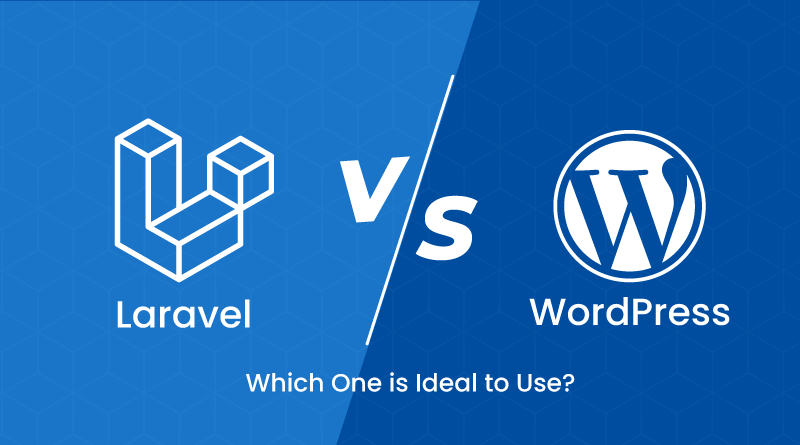Building a modern website or web application has never been more accessible. But with so many tools at your disposal, it can be overwhelming to choose the right platform. Two of the most popular options in the web development world are WordPress and Laravel. Both are powered by PHP, yet they serve distinctly different purposes and audiences.

This detailed guide compares WordPress and Laravel, exploring their strengths, weaknesses, and best use cases. Whether you’re an entrepreneur, business owner, or developer, you’ll walk away with clarity about which platform fits your project perfectly.
Understanding the Foundations
WordPress is a content management system (CMS). It began as a blogging platform but evolved into a flexible system that powers over 43% of websites worldwide. With thousands of themes and plugins, it enables users to create blogs, business sites, portfolios, and online stores without writing much code.
Laravel is a PHP framework designed for developers. Unlike WordPress, Laravel does not provide a ready-made CMS out of the box. Instead, it offers a structured foundation for building custom web applications using the Model-View-Controller (MVC) architecture.
Ease of Use
One of the biggest differences lies in ease of use.
WordPress excels in simplicity. Users can install it in minutes through most hosting providers. Its dashboard is intuitive, making tasks like creating pages, writing posts, and installing plugins straightforward. Non-technical users appreciate that they don’t need to learn PHP to manage their site.
Laravel, on the other hand, requires a strong understanding of PHP and web development. Setting up a Laravel project involves configuring composer packages, routing, authentication, and database migrations. While it is elegant and developer-friendly, it has a steep learning curve compared to WordPress.
Customization and Flexibility
WordPress allows extensive customization through themes and plugins. There are over 60,000 plugins in the WordPress repository, covering everything from SEO optimization to e-commerce functionality. However, this approach has limits. As your project becomes more complex, you may encounter plugin conflicts or performance issues.
Laravel offers unmatched flexibility. Developers can build any functionality without being constrained by a plugin architecture. From APIs to complex dashboards, Laravel empowers you to create custom solutions tailored exactly to your requirements. If your project needs unique workflows or integrations, Laravel is often the better choice.
Performance and Scalability
Performance is critical for user experience and search engine rankings.
WordPress sites can be fast, especially when using a lightweight theme and performance-boosting plugins like caching and image optimization. However, many WordPress sites become sluggish when loaded with too many plugins or poorly coded themes.
Laravel provides more control over performance optimization. Developers can fine-tune queries, use caching strategies, and structure the application for scalability. Laravel is often preferred for applications that expect high traffic and need efficient database management.
Security
Security is a priority for any web project.
WordPress is widely used, making it a frequent target for attackers. Many security vulnerabilities stem from outdated plugins, themes, or weak passwords. However, with proper maintenance, security plugins, and best practices, WordPress can be secured effectively.
Laravel includes security features like CSRF protection, input sanitization, and robust authentication by default. Since developers build functionality themselves, they have full responsibility for maintaining security. Laravel’s approach minimizes the risk of using vulnerable third-party code but requires disciplined development practices.
Development Speed
When you need to launch quickly, the choice of platform matters.
WordPress shines in rapid deployment. You can install a theme, import demo content, and launch a professional-looking website within days. Small business sites, blogs, and portfolios benefit from this speed.
Laravel projects take longer to build because developers start from a blank canvas. Every feature, from user authentication to payment gateways, needs to be implemented. For complex applications, this extra time results in higher-quality, more tailored solutions.
Community and Support
WordPress boasts a massive global community. Millions of users contribute tutorials, forums, themes, and plugins. Whether you have a question or need a specific feature, chances are someone has already solved it.
Laravel has a vibrant and growing community of developers. While smaller than WordPress, it offers excellent documentation, tutorials, and support through platforms like Laracasts. Laravel’s ecosystem continues to expand with packages that accelerate development.
Costs
Budget plays a role in platform selection.
WordPress itself is free and open-source. However, costs can include premium themes, plugins, and maintenance services. For most small to medium sites, expenses remain manageable.
Laravel is also free to use, but development costs are typically higher due to the need for experienced PHP developers. Custom development takes more time and resources, making Laravel projects more expensive upfront.
Best Use Cases
Choose WordPress if:
- You need to create a blog, brochure site, or e-commerce store quickly.
- You don’t have advanced coding skills.
- Your budget is limited.
- You prefer an established ecosystem with thousands of pre-built solutions.
Choose Laravel if:
- You’re building a custom web application.
- Your project demands complex workflows or integrations.
- You have access to experienced developers.
- Performance and scalability are critical priorities.
SEO Considerations
Both platforms can be optimized for search engines, but the approach differs.
WordPress offers SEO plugins like Yoast SEO and All in One SEO, which guide you through on-page optimization. With proper configuration, WordPress sites rank well in search results.
Laravel requires developers to implement SEO best practices manually. You’ll need to handle URL structures, meta tags, sitemaps, and schema markup yourself or through packages. While this adds work, it also allows full control over SEO implementation.
Conclusion
Choosing between WordPress and Laravel comes down to your project’s complexity, budget, and technical skills.
WordPress empowers individuals and small businesses to create beautiful, functional websites without learning to code. Its simplicity, community support, and massive library of themes and plugins make it the go-to platform for millions.
Laravel is a powerhouse for developers who need total control and flexibility. It excels when building custom applications with unique requirements, offering robust security and scalability.
Before deciding, assess your goals carefully. If you need a site that’s quick to launch and easy to manage, WordPress is likely the better fit. If your vision involves tailored features and advanced functionality, investing in Laravel development can pay off in the long run.
Key Notes
- WordPress: Best for blogs, small business sites, e-commerce, and non-technical users.
- Laravel: Best for custom web applications requiring full control.
- Ease of Use: WordPress is beginner-friendly; Laravel demands coding skills.
- Customization: Laravel offers limitless flexibility; WordPress relies on plugins.
- Performance: Laravel gives you granular control; WordPress performance depends on theme and plugin quality.
- Security: Laravel provides built-in protections; WordPress requires careful maintenance.
- SEO: WordPress has powerful plugins; Laravel requires manual setup.
- Cost: WordPress is affordable for most; Laravel projects have higher development costs.



